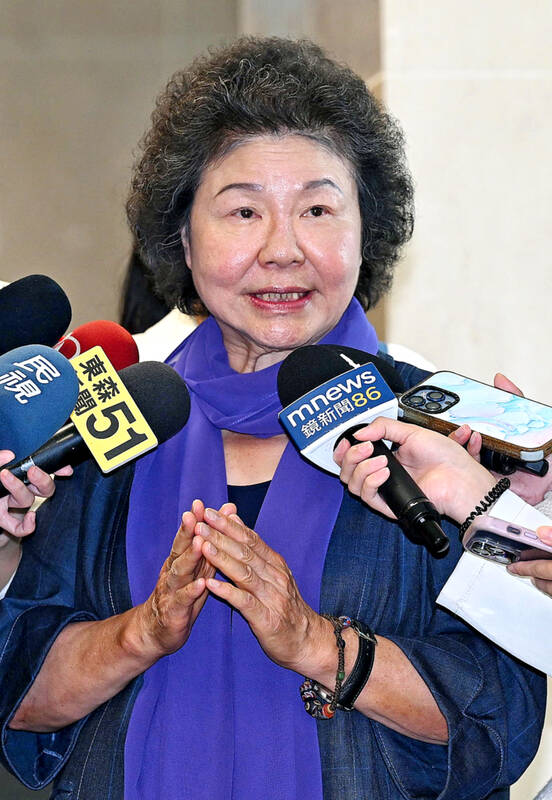Control Yuan President Chen Chu (陳菊) yesterday said she would fully support the abolition of her branch of the government, but it can only be achieved through a constitutional amendment.
Under the Constitution, government powers are shared among five branches: the Executive Yuan, Legislative Yuan, Judicial Yuan, Control Yuan and Examination Yuan.
The Control Yuan is responsible for supervising and auditing the other branches of government.

Photo: Chang Chia-ming, Taipei Times
Lawmakers from all three major parties have over the past few weeks proposed abolishing the Control Yuan, which would require a constitutional amendment.
On Monday, Chinese Nationalist Party (KMT) lawmakers called on their Democratic Progressive Party (DPP) counterparts to join them in freezing the Control Yuan’s budget and approving a constitutional amendment referendum to abolish the branch.
The KMT said if the amendment passes the legislature, it aims to hold the referendum alongside the local government elections in 2026 or the general election in 2028.
Taiwan People’s Party Chairman Ko Wen-je (柯文哲) suggested a gradual approach to abolishing the Control Yuan, as the threshold for amending the Constitution is too high.
The branch could instead be eliminated through freezing its budget and not appointing new members, Ko said on his YouTube program on Monday.
A constitutional amendment requires a three-fourths super majority of a quorum of three-fourths in the legislature to be sent to a referendum. Then half of all eligible voters must vote in favor for the amendment to pass.
Speaking to reporters before a forum in Taipei, Chen said her “ideal” of a government with three branches has not changed, and she looks forward to the abolition of the Control Yuan.
As long as the legislature follows proper constitutional procedures to do so, Chen said she would “fully support and respect” the decision.
However, freezing its budget would contravene Constitutional Interpretation No. 632, she said.
Since it is the Constitution that affords the branch its powers, it must be abolished in a way that accords with procedures set out in the Constitution, she added.
The interpretation handed down in 2007 instructed the legislature to approve Control Yuan members, stating that “all constitutional organs have indispensable responsibilities to ensure the essential existence and regular operation of the Control Yuan,” after the body’s Procedure Committee halted nominations for more than three years.
DPP caucus secretary-general Chuang Jui-hsiung (莊瑞雄) agreed that freezing the budget and refusing to approve members would be unconstitutional.
The president is constitutionally mandated to nominate members of the Control Yuan, and the legislature is mandated to review appointments, he told a news conference, adding that Constitutional Interpretation No. 632 is clear on the matter.
The DPP has always supported abolishing the branch, but it is only possible through a constitutional amendment, he added.
Additional reporting by Huang Ching-hsuan and Chen Cheng-yu

BUILDUP: US General Dan Caine said Chinese military maneuvers are not routine exercises, but instead are ‘rehearsals for a forced unification’ with Taiwan China poses an increasingly aggressive threat to the US and deterring Beijing is the Pentagon’s top regional priority amid its rapid military buildup and invasion drills near Taiwan, US Secretary of Defense Pete Hegseth said on Tuesday. “Our pacing threat is communist China,” Hegseth told the US House of Representatives Appropriations Subcommittee on Defense during an oversight hearing with US General Dan Caine, chairman of the Joint Chiefs of Staff. “Beijing is preparing for war in the Indo-Pacific as part of its broader strategy to dominate that region and then the world,” Hegseth said, adding that if it succeeds, it could derail

CHIP WAR: The new restrictions are expected to cut off China’s access to Taiwan’s technologies, materials and equipment essential to building AI semiconductors Taiwan has blacklisted Huawei Technologies Co (華為) and Semiconductor Manufacturing International Corp (SMIC, 中芯), dealing another major blow to the two companies spearheading China’s efforts to develop cutting-edge artificial intelligence (AI) chip technologies. The Ministry of Economic Affairs’ International Trade Administration has included Huawei, SMIC and several of their subsidiaries in an update of its so-called strategic high-tech commodities entity list, the latest version on its Web site showed on Saturday. It did not publicly announce the change. Other entities on the list include organizations such as the Taliban and al-Qaeda, as well as companies in China, Iran and elsewhere. Local companies need

CROSS-STRAIT: The MAC said it barred the Chinese officials from attending an event, because they failed to provide guarantees that Taiwan would be treated with respect The Mainland Affairs Council (MAC) on Friday night defended its decision to bar Chinese officials and tourism representatives from attending a tourism event in Taipei next month, citing the unsafe conditions for Taiwanese in China. The Taipei International Summer Travel Expo, organized by the Taiwan Tourism Exchange Association, is to run from July 18 to 21. China’s Taiwan Affairs Office spokeswoman Zhu Fenglian (朱鳳蓮) on Friday said that representatives from China’s travel industry were excluded from the expo. The Democratic Progressive Party government is obstructing cross-strait tourism exchange in a vain attempt to ignore the mainstream support for peaceful development

ELITE UNIT: President William Lai yesterday praised the National Police Agency’s Special Operations Group after watching it go through assault training and hostage rescue drills The US Navy regularly conducts global war games to develop deterrence strategies against a potential Chinese invasion of Taiwan, aimed at making the nation “a very difficult target to take,” US Acting Chief of Naval Operations James Kilby said on Wednesday. Testifying before the US House of Representatives Armed Services Committee, Kilby said the navy has studied the issue extensively, including routine simulations at the Naval War College. The navy is focused on five key areas: long-range strike capabilities; countering China’s command, control, communications, computers, cyber, intelligence, surveillance, reconnaissance and targeting; terminal ship defense; contested logistics; and nontraditional maritime denial tactics, Kilby